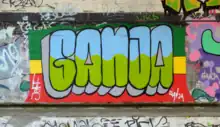Ganja (/ˈɡændʒə/, US: /ˈɡɑːndʒə/; Hindi pronunciation: [ɡaːɲd͡ʒaː]) is one of the oldest and most commonly used synonyms for marijuana. Its usage in English dates to before 1689.[1]
Etymology
Ganja is borrowed from Hindi/Urdu gāñjā (Hindi: गांजा, Urdu: گانجا, IPA: [ɡaːɲd͡ʒaː]), a name for cannabis used as a drug, which is derived from Sanskrit gañjā, referring to a "powerful preparation from Cannabis sativa".[2][3][4][5][6] The word was used in Europe as early as 1856, when the British enacted a tax on the "ganja" trade.[7]
One academic source places the date of introduction of ganja in Jamaica at 1845.[8] The term came with 19th century workers whose descendants are now known as Indo-Jamaicans.[9]
Contemporary use of the term ganja
English use
Ganja is the most common term for marijuana in West Indies.[9][10]
In popular culture
In 1976, Peter Tosh defended the use of ganja in the song "Legalize It".[11] The hip hop group Cypress Hill revived the term in the United States in 2004 in a song titled "Ganja Bus", followed by other artists, including rapper Eminem, in the 2009 song "Must Be the Ganja".[7][12]
In other languages
Derivatives of the term are used as generic words for marijuana in several languages, such as Indonesian/Malay (ganja), Khmer (កញ្ឆា, kanhchhea), Lao (ກັນຊາ, kan sa), Thai (กัญชา, gancha), Tiwi (kanja),[13] and Vietnamese (cần sa).
References
- ↑ "10 Words From Hindi & Urdu". Merriam-Webster. Archived from the original on 15 April 2019. Retrieved 15 April 2019.
- ↑ Schwartz, Martin (2008). "Iranian L, and Some Persian and Zaza Etymologies". Iran & the Caucasus. 12 (2): 281–287. doi:10.1163/157338408X406056. JSTOR 25597374.
- ↑ McGregor, R. S. (Ronald Stuart) (29 November 1993). "The Oxford Hindi-English dictionary". dsal.uchicago.edu.
- ↑ Torkelson, Anthony R. (1996). "The Cross Name Index to Medicinal Plants, Vol. IV: Plants in Indian medicine, p. 1674, ISBN 9780849326356, OCLC 34038712". CRC Press. Taylor & Francis. ISBN 9780849326356.
- ↑ Kranzler, Henry R.; Korsmeyer, Pamela (2009). "Encyclopedia of Drugs, Alcohol & Additive Behaviour". Gale. p. 28. ISBN 978-0-02866-064-6.
- ↑ Steinmetz, Katy (20 April 2017). "420 Day: Why There Are So Many Different Names for Weed". Time. Archived from the original on 12 August 2018. Retrieved 16 March 2019.
- 1 2 Linder, Courtney (19 April 2015). "Pot patois: A comprehensive etymology of marijuana". The Pitt News. Archived from the original on 3 April 2019. Retrieved 17 March 2019.
- ↑ Mansingh, Laxmi; Mansingh, Ajai (1999). Home Away from Home: 150 Years of Indian Presence in Jamaica, 1845-1995. I. Randle Publishers. p. 127. ISBN 9768123397.
- 1 2 Lisa Rough (14 May 2015). "Jamaica's Cannabis Roots: The History of Ganja on the Island". Leafly. Archived from the original on 11 April 2019. Retrieved 11 April 2019.
- ↑ Courtwright, David T. (2009). Forces of Habit. Harvard University Press. ISBN 978-0-674029-90-3.
- ↑ Pieter Coertzen; M Christiaan Green; Len Hansen, eds. (2015). Law and Religion in Africa: The quest for the common good in pluralistic societies. African Sun Media. p. 186. ISBN 978-1-919985-63-3.
- ↑ Rafael Pérez-Torres (2006). Mestizaje: Critical Uses of Race in Chicano Culture. U of Minnesota Press. pp. 97–. ISBN 978-0-8166-4595-4.
- ↑ Dictionary AuSIL Archived 3 March 2023 at the Wayback Machine
